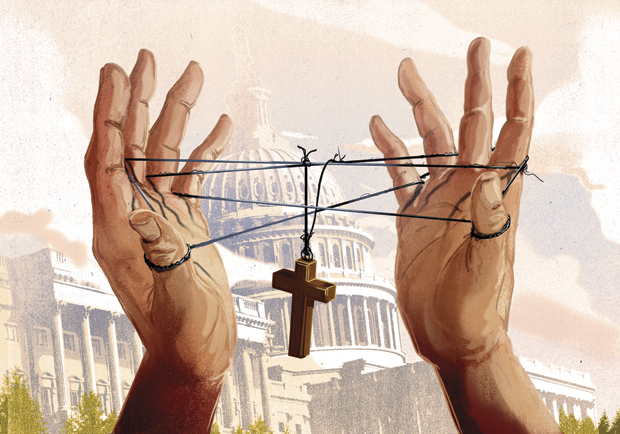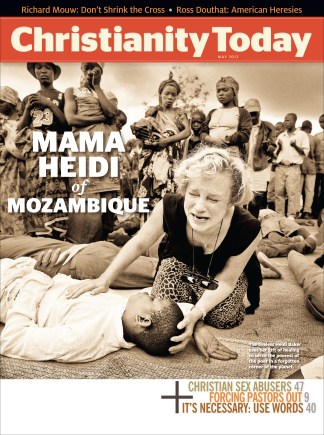The first chapter of Stephen V. Monsma’s new book is entitled “The Issue That Will Not Go Away.” It refers to conflicts between the ever-widening regulatory reach of the government—state and federal—and the obligation religious organizations feel to remain faithful to their missions.
Pluralism and Freedom: Faith-Based Organizations in a Democratic Society
Rowman & Littlefield Publishers
238 pages
Boy, did he get that right. Examples of this intractable conflict come swiftly to mind. World Vision has defended its religious hiring rights against an employee lawsuit. Catholic Charities of Boston has abandoned its adoption placement services rather than submit to a state requirement to place children in same-sex households. The Supreme Court has affirmed the power of Hastings College of the Law to compel its chapter of the Christian Legal Society to consider non-Christian leadership candidates. Only months ago, the Obama administration failed (thanks, ironically, to the same Supreme Court) in its bid to force a Lutheran school to retain a teacher who had violated its teachings on conflict resolution. And the administration continues to defend its policy of mandating that all employers—with only the narrowest exemption for houses of worship—purchase health insurance plans that cover contraception, sterilization, and abortifacients.
In Pluralism and Freedom: Faith-Based Organizations in a Democratic Society (Rowman & Littlefield), Monsma—senior research fellow at Calvin College’s Henry Institute and one of the world’s leading students of faith-based social service organizations—looks beyond our borders for a fresh perspective on this most contentious issue. To the strategies of litigation and political argument developed in the United States, he adds the outlook known to earlier generations of European Christian Democrats as “structural pluralism.”
Christianized Individualism
According to Monsma, both conservatives and liberals devote their attention primarily to the relationship between the (believing or unbelieving) individual and the government. Conservatives see “big government” as shrinking the realm of individual choice, while liberals expect government power to protect and expand that realm. (Consider their vigorous defense of the contraceptive mandate as safeguarding women’s rights.) But Monsma contends that neither side has an adequate theoretical framework for comprehending “the host of intermediary social structures—families, neighborhoods, religious congregations, associations, and nonprofit service organizations—that lie between the individual and the government.”
This leaves faith-based groups and their allies largely reduced to speaking the individualistic language of freedom of conscience, or else promising services that might enable the downsizing of government. But these considerations hardly suffice to justify faith-based efforts in public life. Monsma asks, for instance, how we would respond if faith-based organizations were proven less effective than their government or secular counterparts, or if the religious elements in faith-based services were proven incidental to their effectiveness.
This is where structural pluralism comes in. It rests, Monsma argues, on the philosophy of “personalism”—a “Christianized individualism” distinct from the atomistic individualism frequently associated with America’s classical liberal tradition. Personalism emerged in 19th-century Europe as a “third way” alternative to classical liberalism and socialism. Personalist thinkers emphasize two things. First, writes Monsma, the human personality is “social as well as individual and spiritual as well as material.” And second, “We engage in the distinctive activities of human beings—creating culture, making artifacts, worshipping, providing for our families, finding our identity and purpose—not as solitary individuals, but in conjunction with other human beings.” We’re not just individuals who enter voluntarily into a variety of social contracts. Rather, we’re by nature made for membership in communities. The solitary individual is an abstraction; the real person is always embedded in a web of relationships.
If human beings naturally form a multiplicity of associations, then these associations are as ‘natural’ as the people who compose them. If individuals have rights, then so too do the associations they form.
From this point of departure, it is but a small step to structural pluralism. If human beings naturally form a multiplicity of associations, then these associations are as “natural” as the people who compose them. If individuals have rights that can be asserted against government, then so too do the associations they form. If the state cannot “tread on” the rights of individuals, neither can it tread on the rights of associations. To be sure, Monsma says that associations enjoy only a “limited or quasi-autonomy.” Every serious structural pluralist recognizes areas where individuals may act freely and where governments may issue authoritative commands. The great Dutch neo-Calvinist Abraham Kuyper spoke of “sphere sovereignty,” and Roman Catholic social teaching speaks of “subsidiarity.” In both lines of thought, government has a limited role. It retains sovereignty in some spheres (like national defense), while in others (like education) it supports—but never undermines—the institutions that perform the heaviest lifting.
Common Ground
Now, it might seem that there are two obvious objections to advocating structural pluralism in America. First, is it not at odds with our “public philosophy”—articulated above all in the Declaration of Independence—which owes so much to classical liberalism? We’re individualists, we say, unlike our European cousins. Second, it’s hard to see how a framework associated with European Christian democracy could appeal to a religiously polarized polity. To the degree that structural pluralism rests on a theistic foundation, it might struggle to overcome the divide between secular and religious perspectives on the right ordering of public life.
Monsma has answers to these objections. He begins by observing some parallels between the 19th-century circumstances faced by European Christian Democrats and those we face today. While Americans, like Europeans, once took for granted a tacitly Christian culture, we’re now called upon to offer an explicit defense of Christianity (and religion in general) in the public square. What’s more, Monsma argues, structural pluralism, though consistent with a Christian view of the person—that is, of human beings as created for community—can also be couched in secular understandings of human nature. Thus, Christian Democrats can make common cause with communitarians, classical Republicans, Burkean conservatives, and neo-Aristotelians, none of whom necessarily worship the triune God.
Structural pluralism can make an additional pitch to more secular-minded citizens. Consistent with the view that faith and church membership can’t be compelled, structural pluralists have to be neutral toward the kinds of associations human beings form. I can’t claim for my local Christian homeschooling group any status that I’m not willing to extend to my secular homeschooling neighbors, let alone to Jewish day schools, Catholic and other Christian schools, and charter and other public schools. In other words, there is a common ground that Christians can find with their secular fellows, focusing on “freedom of association,” with the state treating religious and nonreligious groups in the same way. If Planned Parenthood can engage in mission-sensitive hiring, so can the Salvation Army or the local crisis pregnancy center.
At least in the short run, I doubt Monsma’s book will persuade the many Americans who remain hostile toward the public missions of religious groups. But to those more favorably inclined, he does offer a way of understanding and publicly defending these missions without relying upon the individualistic language of classical liberalism. Pure individualism too easily begets the claim that our freedoms are essentially private freedoms—that they don’t extend to the churches we join and the organizations we feel called to support. Learning this new understanding, this new language, and these new arguments—and recognizing their secular echoes—will make for a more winsome Christian presence in the public square. There we can prayerfully await the time when everyone will “again [be] touched, as surely they will be, by the better angels of our nature.”
Joseph Knippenberg is professor of politics at Oglethorpe University in Atlanta.
Copyright © 2012 Christianity Today. Click for reprint information.
Related Elsewhere:
Pluralism and Freedom is available from Barnes & Noble and other retailers.
Christianity Today previously interviewed Monsma in 2006.
Other CT articles on politics and law include:
Polarizing Politics by Defending the Declaration | Social conservatism draws its viability from America’s founding principles. (April 26, 2012)
Mass Appeal: Evangelicals Copy More of Catholic Playbook to Oppose Contraception Ruling | Mandate has evangelicals and Catholics finding common ground on ethics—and strategy. (April 1, 2012)
Contract Concern: USAID Policy on Hiring Alarms Charities | Groups concerned about religious liberty fear they could be challenged in the future. (March 23, 2012)











